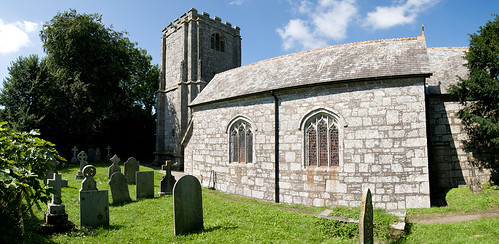 |
| Church of St Wenn, Cornwall |
Wenna is a vernacular form of the Cymric classic Gwen, which means "white, fair, blessed". It comes to us from the Cornish—those same Celts who famously reinterpreted the related Welsh name Gwenhwyfar as Jennifer.
This humble little name derives clout from the fact that Cornwall, "Land of the Saints" has two Saint Wenna's, both of them semi-mythical church founders of the Dark Ages. Wenna of Talgarth is numbered among the very many daughters of Brychan, an early Welsh king, making her a sister of Saints Dwynwen and Endellion.
According to an old folk tradition, described by the English poet Drayton in his Poly Olbion (1612), the king had 24 daughters who, "for their beauty and purity, were changed into rivers, all of which flow into the Severn" (the longest river in Great Britain).
As for her own legend, this Welsh princess-turned-nun, born Gwen, eventually went south to Cornwall as a missionary, where it seems her new audience couldn't pronounce her name as-is. After establishing several churches (one of which had a holy well consecrated to her) she was martyred by enraged pagan Saxons while visiting home in Wales—how and why is unclear. Of the other Saint Wenna, a Cornish queen consort (also imported from Wales, also born Gwen but renamed Wenna), even less is written.
If these sainted Welsh expats inspired everyday use of the name in their adopted country, it seemingly wasn't recorded; that is to say,
And, despite the earthy minimalism of "WEN-uh", I'd guess that, rather than as standalone Wenna, you're more likely to encounter it in the form of a suffix to already-extremely-rare (not to mention epic high-drama) names like Morwenna, Lowenna and Sowenna ("success"). There are also the Latinized names Crewenna, Conwenna, Merwenna (Old English: Mærwynn), Sewenna (O.E. Sæwynn) and Athwenna (Cornish: Adhwynn).
Having said that... Wenna's apparent lack of usage doesn't diminish its legitimacy as a "real name", grounded in Cornish folk tradition.
 Besides, this quaint rarity-of-rarities possesses the same easy disyllabic charm as Willa, Emma, Tessa, Stella, Pippa, Calla, &c. Its sound is so short 'n' sweet, so milk-and-honey that it risks coming off as cutesy/precious/immature; but then, she does have weight on her light-as-a-feather brother/sis Wynn (from the same Welsh root), compared to which she feels especially rich, warm and rustic.
Besides, this quaint rarity-of-rarities possesses the same easy disyllabic charm as Willa, Emma, Tessa, Stella, Pippa, Calla, &c. Its sound is so short 'n' sweet, so milk-and-honey that it risks coming off as cutesy/precious/immature; but then, she does have weight on her light-as-a-feather brother/sis Wynn (from the same Welsh root), compared to which she feels especially rich, warm and rustic.Soft, natural and unexpected Wenna has virtually zero visibility yet still enjoys an aura of nostalgia, whimsy and even romance. A spirited compound name like Wenna-Blythe, for example, would make a fine literary character, am I right? Anyway, I can picture a Wenna having high tea/brunch/what-have-you with the likes of Oona, Jemima, Mab and Penelope.
Odds & ends
- In modern Cornish (an endangered language), Saint Wenna is known as Sen Gwenna. It's also spelled Wena, and used in Wales as a short form of Morwenna or Awena (meaning "muse, inspiration").
- Rhyming names include the lovely modern Senna and relative chart-toppers Jenna (the 160th most popular name for U.S.-born girls in 2010) and Brenna (#465). I've also spotted Wrenna, a recent spin on Wren taken from the Old English word for the songbird (albeit the male wren—opposed to wrenne "she-wren"). The name Menna is "used regularly in Wales in modern times" (though its meaning is uncertain), given to 24 girls born in 2010 in England/Wales.
- Nicknames for Wenna? Besides Wenn, I think Wennet ("WEN-it") or Winnet ("WIN-it", an old diminutive of Winifred) would do.
- Wentlyan was a medieval English form of Gwenllian ("gwen-HLEE-ahn"); they too struggled with the nasalized Welsh "gw", 'twould appear.
- The name Wendla, a feminine form of Wendel, was used by German dramatist Frank Wedekind for the heroine of his highly controversial play Spring Awakening (1891), about an adolescent schoolgirl's tragic experience of her sexually oppressive culture. Recently it was adapted into a rock musical with Lea Michele of Glee fame originating the role of Wendla; the actress described Spring Awakening as "groundbreaking, edgy and honest."
- I hesitate to include this mention of the oddly named heiress Winnaretta Singer, but her life was big enough that she pulled off her heavy-duty name.

Wow! Truly informative!
ReplyDelete